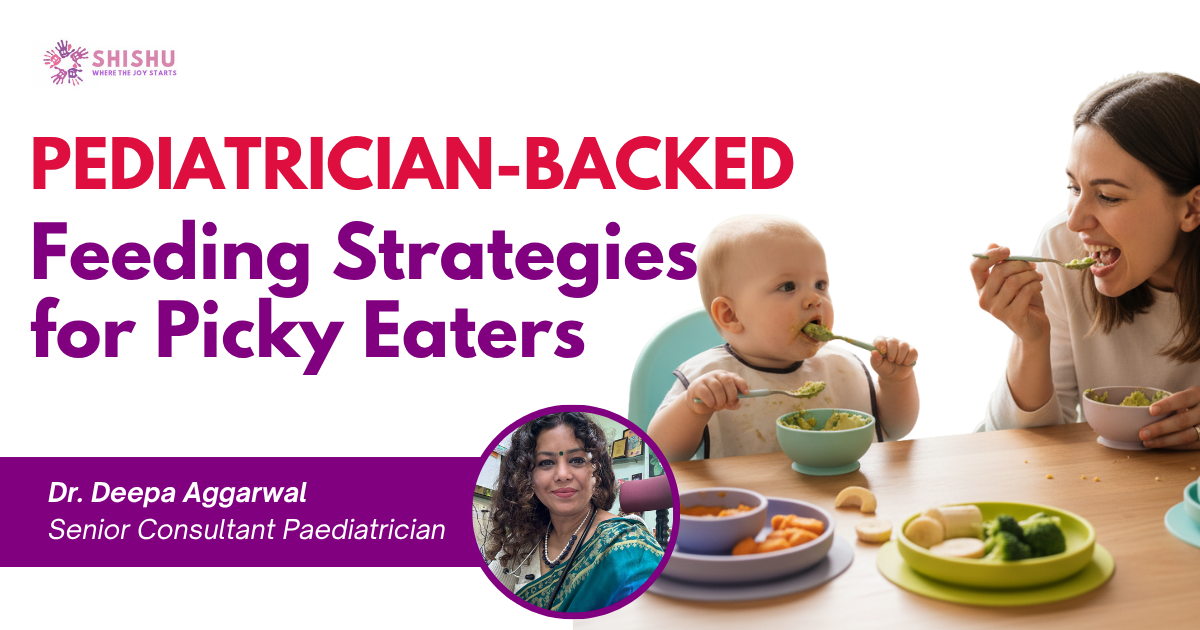
Why Some Babies Refuse to Touch Food | Pediatrician-Backed Feeding Strategies for Picky Eaters
Many babies avoid touching food in the early feeding journey. Learn pediatrician-approved strategies, sensory tips, and long-term nutrition guidance to reduce picky eating and build healthy food habits from the start.
As a Pediatrician, one of the most common concerns parents bring to me is…
“My baby won’t touch food. I’m worried is something wrong?”
First, you are not alone. 👶❤️
Most infants develop food curiosity gradually. Touching food is actually a sensory learning milestone, not a guarantee of eating.
🧠 Why babies won’t touch food (Medical reasons)
Some common developmental and sensory factors include:
• Underdeveloped fine motor skills
• Sensitivity to new textures or temperatures
• Fear of stickiness / wet hands
• Overstimulation during mealtimes
• Pressure or fear from past feeding experiences
Early picky eating is strongly linked to sensory food exploration, responsive feeding, and positive mealtime routines.
✅ Pediatrician-Approved Strategies to Help Your Baby Touch Food
1️⃣ Establish routine and structure
Babies thrive on predictable mealtimes.
Offer food every 2–3 hours → No grazing in-between.
This increases natural hunger cues and interest in food.
2️⃣ Exposure without pressure
Research shows it can take 10–15 exposures before a child accepts a new food.
Never force, bribe, threaten, or compare.
Goal: Comfort first → Consumption later ✅
3️⃣ Sensory exploration is learning
Before eating comes touching.
Let them:
• Squish
• Smell
• Drop
• Smash
• Observe
Mess is developmental, not misbehavior.
4️⃣ Role modeling works
Babies copy everything!
Eat together and let your baby watch you:
• chew
• lick
• explore textures
Serve the same food for everyone (avoid separate meals).
5️⃣ Make food fun
Food art, colorful plates, funny shapes, dipping options → build confidence.
Involve babies in steps like holding a spoon or touching ingredients.
6️⃣ Avoid distractions
Screens, toys & running around → disconnect babies from hunger cues.
Family eating promotes attention + connection.
7️⃣ When to see a doctor 🚨
Seek professional help if there is:
✔ Weight loss / poor weight gain
✔ Severe texture refusal
✔ Choking, vomiting, difficulty swallowing
✔ Strong emotional distress at mealtimes
These signs could suggest feeding disorders, oral-motor issues, or sensory processing concerns needing early intervention.
✅ Key Takeaway
Touching food is a successful meal, even if nothing is swallowed.
Positive exposure today leads to healthy eating tomorrow. ❤️
If you’re feeling overwhelmed, reach out you’re doing great, and your baby is learning every day.
📌 Save & Share this guide with parents who need support!
Need help tailored to your baby? Contact us.
#PickyEating #BabyFeeding #InfantNutrition #PediatricianAdvice #FeedingMilestones #StartingSolids #BabyLedWeaningTips #ToddlerNutrition #SensoryFeeding #HealthyKids #ParentSupport
